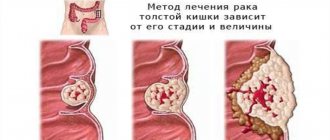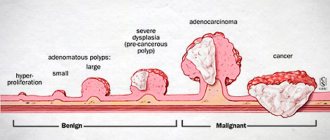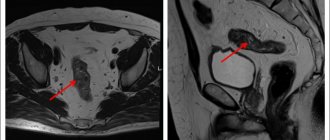Malignant neoplasms can appear in the intestines. It consists of the small and large intestine. In this case, most often malignant neoplasms are detected in the rectum. Oncological processes in this area have certain course features and signs. However, treatment methods are generally similar to other malignancies. So, a course of chemotherapy for intestinal cancer may be prescribed. It is usually performed before or after surgical removal of the tumor. The procedure consists of using antitumor drugs that are injected into the patient's body.
The procedure is extended over a certain period of time. The action is carried out to reduce possible side effects and to most effectively destroy malignant cells. After completing the process, tumor growth may stop and its size may decrease. The patient's overall condition may improve significantly. However, a number of side effects may occur. To minimize the risk of encountering them, the doctor may prescribe supportive therapy.
When is bowel chemotherapy performed?
When faced with a doctor's offer of a procedure, patients are eager to find out how chemotherapy works for bowel cancer. During it, various combinations of antitumor drugs are used, which are combined into regimens. Up to 3 medications can be used at a time. With this you can achieve the most effective result. The general condition of the patient is taken into account. People are not able to tolerate the simultaneous use of several anticancer drugs at once, since side effects may occur. Because of this, the scheme is adjusted, taking into account individual characteristics.
If the disease is detected at a late stage, chemotherapy is prescribed as a method aimed at improving the patient’s quality of life, minimizing the symptoms of the disease, stopping the oncological process, and preventing tumor growth.
Chemotherapy for colon cancer after surgery may be prescribed if the disease is at stage 2 or later. The fact is that in this case, guaranteeing complete removal of the cancer is extremely problematic. Malignant tumor cells may remain, which can subsequently lead to relapse. After using chemotherapy, the likelihood of developing a new situation is lower, since the drugs have an effect on malignant cells, preventing their growth and reproduction.
Additionally, you cannot do without using the method if the fact of metastasis is detected. How many courses of chemotherapy are prescribed for colon cancer will directly depend on the stage of the disease and the main features of the current situation.
Chemotherapy may be prescribed before surgery. In this case, the procedure is aimed at reducing the size of the tumor, which will make surgery easier and also reduce the likelihood of relapse.
Combination targeted therapy
Some tumors have a specific mutation called BRAF V600E. Tumors that have this mutation may be treated with a class of drugs called BRAF inhibitors.
A combination using the BRAF inhibitor dabrafenib and panitumumab could be used to treat people with metastatic colorectal cancer with this mutation who have received at least first line chemotherapy.
For colorectal cancer, the tumor may be tested for other molecular markers, including BRAF, HER2 overexpression, and others.
Treatment regimen for intestinal oncology
Understanding how chemotherapy is carried out for intestinal oncology, the patient will find out that treatment is carried out in regimens. This method gives a person time to recover. The body has time to recover. When finding out how many chemotherapy sessions are prescribed for intestinal cancer, a person learns that the indicator varies from 2 to 12 cycles. They take about 6 months. Substances are administered to the patient intravenously. The regimen is selected individually, taking into account the characteristics of the body, as well as the stage of the disease. The choice of chemotherapy regimen for colon cancer may depend on the size of the tumor and the possibility of surgical intervention. The following types of procedure are distinguished:
1. Adjuvant. It is used when a malignant tumor has been removed. After the operation, the patient is allowed to recover and come to his senses. Chemotherapy begins after 6-8 weeks. During this time, the healing process is completed. The goal of the method is to remove metastases.
2. Neoadjuvant. Treatment in this case is carried out before surgery. The method is often combined with radiation therapy. Treatment is carried out in advance. It begins one and a half months before the date of the scheduled operation.
3. Palliative. The method is used if it is impossible to remove the tumor for any reason. The method is used to alleviate the patient’s condition and slow down the progression of the malignant process. The impact is carried out in courses. Their duration in total is about 6 months.
Having learned how chemotherapy is carried out for intestinal cancer, it is worth paying attention to the means that are used during the procedure. The main drugs are fluorouracil together with calcium folinate. If the symptoms are less severe, fluoropyrimidine can be used.
When figuring out whether chemotherapy helps with colon cancer, it is necessary to take into account that the drugs do not have a selective effect. They attack all cells that have properties similar to cancer cells. All this leads to possible side effects. As a result, the patient may experience:
Nausea, vomiting;
the appearance of bleeding;
· excessive fatigue;
redness of the mucous membrane;
· problems with the gastrointestinal tract;
· increased body temperature.
To reduce negative reactions, breaks are used between cycles. Additionally, auxiliary therapy is prescribed. The patient must adhere to a certain diet. It allows you to speed up your recovery.
Immunotherapy
Immunotherapy is the newest direction in the treatment of cancer. The essence of this technique is to mobilize the body’s own defense (immunity) to destroy malignant tumors.
One type of immunotherapy is the use of checkpoint inhibitors.
- Pembrolizumab targets the PD-1 receptor on tumor cells. It is the presence of this receptor that masks tumor cells, preventing them from being recognized by the immune system. Pembrolizumab is used to treat metastatic colorectal cancer that has a molecular feature called microsatellite instability (MSI-H) or DNA repair disorder (dMMR).
- Nivolumab is used to treat people 12 years of age and older with metastatic MSI-H or dMMR colorectal cancer that has recurred or progressed after chemotherapy with fluoropyrimidines (such as capecitabine and fluorouracil), oxaliplatin, and irinotecan.
The combination of two immunotherapies, Nivolumab and Ipilimumab, is approved for the treatment of patients 12 years of age or older with metastatic MSI-H or dMMR colorectal cancer that has recurred or progressed after chemotherapy with fluoropyrimidines (such as capecitabine and fluorouracil), oxaliplatin, and irinotecan.
Chemotherapy process
Wanting to know how chemotherapy is done for colon cancer, the patient will find out that there are two main methods of administering drugs. In particular, they can be prescribed in the form of tablets or liquid forms. In the second case, the drugs are introduced into the patient’s body using droppers. Drugs in tablet form are usually used in the initial stages of the disease. Such medications cause fewer side effects. However, their performance is also reduced. Therefore, this method is used quite rarely.
Most often, substances are administered intravenously. The procedure is repeated at certain intervals. It is usually done daily until one cycle is completed. Then take a break. To avoid causing excessive harm to the patient's veins, a catheter is inserted. It also reduces the risk of complications that may arise due to infection entering the human body due to constant injury to the walls of blood vessels. The system is partially hidden under the skin, which allows it to be used for long periods of time without interfering with a bath or shower.
One solution infusion procedure takes about 2-3 hours. The patient will undergo 4 to 6 cycles. The entire treatment can take up to 1 year. Sometimes the period is significantly shortened. The exact period depends on the patient’s condition and the characteristics of the disease. The frequency of drug administration may also change.
Selection of chemotherapy drugs
Chemotherapy drugs are highly toxic, so side effects occur in most patients. The task of doctors is to reduce the negative consequences for the body.
The severity of side effects depends on the individual characteristics of the body and the dosage of medications. That is why doctors at the oncology center select doses of drugs strictly individually, depending on many factors:
- international clinical guidelines;
- stage of cancer;
- characteristics of the tumor;
- sensitivity of its cells to drugs;
- degree of metastasis;
- patient's health status;
- concomitant or chronic diseases;
- presence of contraindications.
Bowel chemotherapy before and after surgery
If the tumor is localized in the intestine, doctors first try to remove the tumor. To do this, an operation is performed. After this, chemotherapy may be prescribed. It is aimed at preventing relapses. This treatment option is used most often. With the help of anticancer drugs, it is possible to remove malignant cells that remain in the body.
However, another treatment method is also possible. Sometimes chemotherapy is given before surgery. The procedure in this case is aimed at reducing the size of the tumor, stabilizing the tumor process, and the possibility of reducing the area of surgical intervention. Additionally, this approach also reduces the risk of relapse.
The reaction of the body and neoplasms to medications must be taken into account. If a noticeable reduction does not occur, the treatment method can be supplemented with radiation therapy. If the treatment regimen does not give a good result, it is reviewed. As a result, other drugs are selected.
Classification - what is important to consider
When planning treatment, a classification is used based on the size of the tumor, the existing invasion of the intestinal wall and the degree of spread of malignant cells to other tissues and organs. Thus, in stage 2 rectal cancer, a tumor up to 5 cm in size extends beyond the boundaries of the intestinal wall; cancer cells can be detected in the nearest lymph nodes.
The degree of tumor aggressiveness is also important. Depending on the morphological structure of cells, highly differentiated, moderately and poorly differentiated tumors are distinguished. The most common rectal neoplasms are well-differentiated adenocarcinomas; they are characterized by slow growth; in contrast, poorly differentiated tumors have a more aggressive course and poor prognosis.
Doses and regimens of use of anticancer drugs
Antitumor drugs and their dosage are selected strictly individually.
Each drug has its own characteristics and features. When conducting chemotherapy, the following parameters are important:
- drug dose
- mode and method of its administration
- interval between injections
- complications associated with its use.
The dose of the drug is calculated based on the chemotherapy regimen, height, weight, age, condition of the patient, and in some cases, based on the patient’s laboratory parameters.
Risk factors
You are at risk for colorectal cancer if you are over 40-50 years old or if you have been diagnosed with any of the following:
- precancerous subtype of polyp
(adenoma); - benign polyp with a diameter of more than 1 cm;
- several polyps;
- polyp in the lower gastrointestinal tract;
- polyp that is 5 years or more old;
- dysplasia of the intestinal lining at the site of polyp removal;
- polyposis syndrome (familial adenomatous polyposis, Lynch syndrome, etc.);
- IBD ( ulcerative colitis
or
Crohn's disease
); - chronic colitis;
- papillomas and condylomas in the rectum;
- diabetes mellitus, insulin resistance, high BMI;
- weakened immunity (HIV infection, suppressive therapy);
- previous cancer that required radiation therapy to the abdominal organs;
- pathogenic mutations in genes associated with hereditary forms of colorectal cancer.
The likelihood of developing colorectal cancer is greatly influenced by quality of life. Sedentary work, low physical activity, bad habits (smoking, alcohol), poor diet low in fiber and high in animal fats, lack of sun exposure and vitamin D deficiency provoke colorectal cancer.
. It is not surprising that among residents of cloudy and rainy St. Petersburg, colorectal cancer has taken 1st place among cancer diseases.
According to the St. Petersburg Health Committee for 2022, 13.7% of all identified cases of cancer in St. Petersburg residents, without regard to gender, are colorectal cancer.










